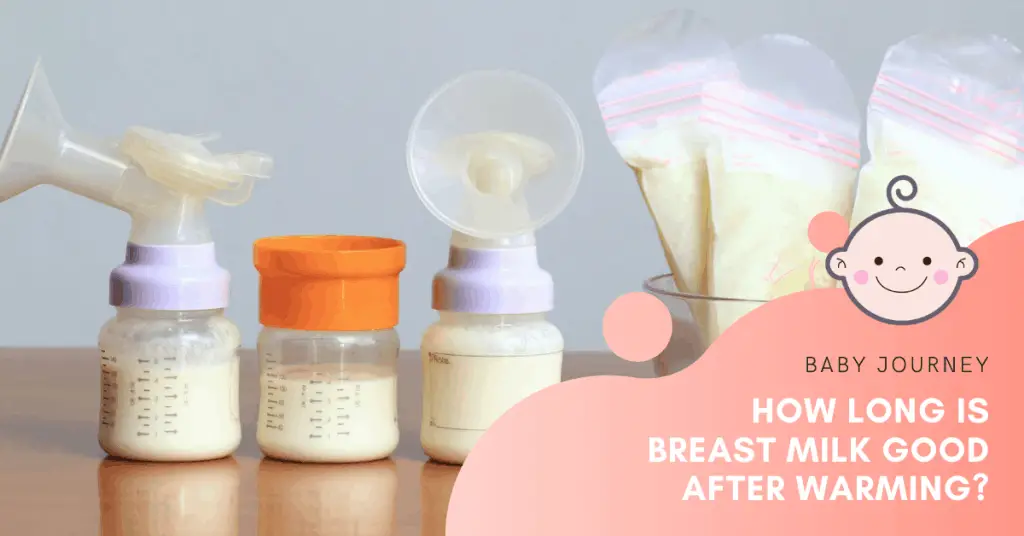Breast milk is a vital source of nutrition for babies and is known to have a unique smell and taste. However, sometimes the smell of breast milk can be concerning, especially if it smells like eggs or rotten eggs. This can be a cause for worry for new mothers on “Why Does My Breast Milk Smell Like Eggs?”.
There are several reasons why breast milk may smell like eggs or rotten eggs. One common cause is the presence of excess lipase in the human milk, which can cause the milk to have a soapy or metallic taste and smell. Another reason may be due to an infection in the breast, such as mastitis, which can cause the human milk itself to have a sour smell. Additionally, certain foods or medications that the mother is consuming may also affect the smell of the human milk.
It is important for mothers to understand the reasons why breast milk may smell like eggs or rotten eggs and to seek medical advice if they are concerned. By identifying the cause of the smell, mothers can take the necessary steps to ensure that their baby is receiving the best possible nutrition.
- Understanding Breast Milk Smell
- Why Does My Breast Milk Smell Like Eggs?
- Impact of Diet on Breast Milk Smell
- Storage Techniques and Breast Milk Smell
- Lipase and Its Effect on Breast Milk
- Scalding Breast Milk to Reduce Smell
- Breast Milk, Medication and Smell
- Issues Related to Breast Milk Smell
- Breast Milk Smell and Baby's Acceptance
- Conclusion
Understanding Breast Milk Smell
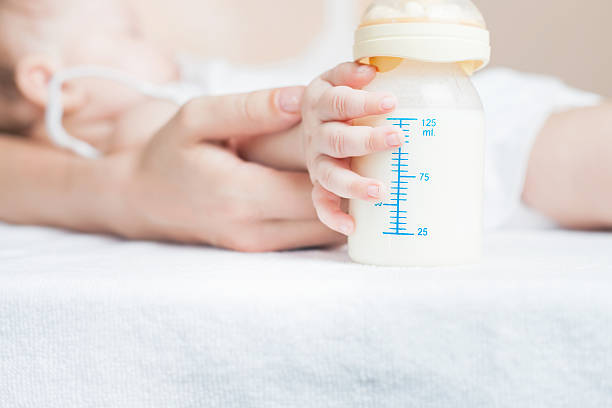
Breast milk is known to have a unique smell and taste that can vary from person to person. Some mothers may notice that their breast milk smells like eggs or even rotten eggs, which can be concerning. However, this is a common occurrence and is usually harmless.
The smell of breast milk is influenced by various factors, including the mother’s diet, medications, and hormonal changes. Breast milk can also change in smell and taste depending on how long it has been stored, the temperature at which it was stored, and the presence of certain enzymes.
One of the most common reasons why breast milk may smell like eggs is due to the presence of excess lipase activity. Lipase is an enzyme that is naturally present in breast milk and helps to break down fats. However, in some cases, excess lipase can cause fresh milk to have a very soapy taste or metallic taste and smell like eggs or even vomit.
It’s important to note that breast milk that smells like eggs is still safe for babies to consume. However, some babies may refuse to feed on breast milk that has a strong odor or taste. In such cases, mothers can try scalding their breast milk before storing it to deactivate the lipase and prevent the smell from developing.
In some rare cases, a strong odor or taste in breast milk may be a sign of an underlying health condition. Mothers who notice a persistent smell or taste in their breast milk that is unpleasant or unusual should consult their healthcare provider to rule out any underlying issues.
Overall, understanding the factors that influence breast milk smell can help mothers identify any changes in their breast milk and take appropriate steps to ensure their baby’s health and well-being.
Why Does My Breast Milk Smell Like Eggs?
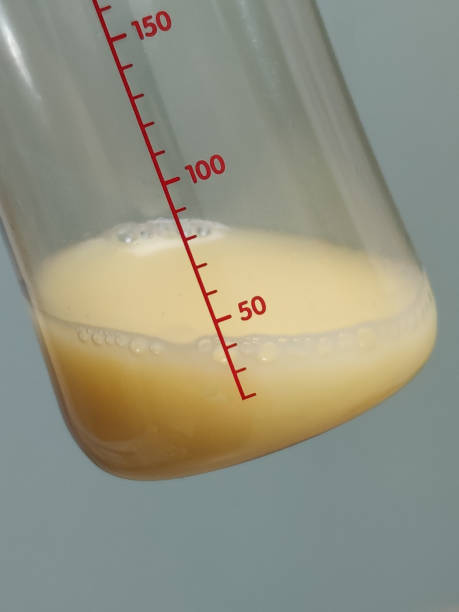
Breast milk is a vital source of nutrition for newborns, and it’s normal for it to have a unique smell and taste. However, sometimes breast milk can develop an unpleasant odor that resembles eggs or rotten eggs. Here are some possible causes of this egg-like smell in breast milk:
High Lipase Levels
One of the most common reasons for the egg-like smell in breast milk is high lipase levels. Lipase is an enzyme that breaks down fats in breast milk, and it’s present in all breast milk. However, some women have higher levels of lipase than others, which can cause the milk to develop a soapy or metallic taste and a smell similar to eggs or rotten eggs. This change in taste and smell can occur within 12-24 hours of storing the milk in the fridge or freezer.
High Lipase Activity
While lipase levels can cause the egg-like smell in stored breast milk sometimes, the true cause of the sour smell and taste is the rate of lipase activity. Some women can store milk in the refrigerator or freezer for days without noticing any changes in taste or smell, while others may notice changes within hours. The rate of lipase activity can vary depending on several factors, including the mother’s diet, storage temperature, and the age of the stored milk.
Storage Conditions
The storage conditions of breast milk can also affect its smell and taste. If the milk is stored in a container that isn’t clean or has been used to store other foods, it can develop an unpleasant odor. Additionally, if the milk is stored in the fridge or freezer for too long, it can develop a sour smell and taste.
Diet
A mother’s diet can also affect the smell of her breast milk. For example, if a mother eats foods with strong flavors or spices, it can affect the taste and smell of her milk. Additionally, if a mother consumes foods that contain sulfur compounds, such as eggs or onions, it can cause her milk to smell like rotten eggs.
In conclusion, the egg-like smell in breast milk can be caused by several factors, including high lipase levels, high lipase activity, storage conditions, and diet. If a mother notice changes in the smell or taste of her breast milk, she should consult with her healthcare provider to rule out any underlying health conditions.
Impact of Diet on Breast Milk Smell

Breast milk is known to have a unique smell and taste, but sometimes these can be early signs of certain health conditions. One of the factors that can affect breast milk smell is the mother’s diet. While breast milk is always the best food for babies, some foods can cause changes in the smell and taste of breast milk.
Certain foods, such as garlic, onions, and spices, can be passed through breast milk and affect its smell. A mother’s diet can also impact the nutritional value of breast milk, which can in turn affect the smell. For example, consuming a balanced diet that includes a variety of fruits, vegetables, and whole grains can help ensure that breast milk contains all the necessary nutrients and smells fresh.
Solid foods and baby cereals can also impact high lipase breast milk, fat and the smell of breast milk. When a baby starts eating solid foods, their digestive system changes, which can affect the composition of high lipase breast milk. For example, if a mother is feeding her baby oatmeal, the fiber in the oatmeal can cause gas in the baby, which can in turn affect high lipase milk and the smell of breast milk.
It’s important to note that breast milk that smells like eggs or rotten eggs may be a sign of high lipase activity. Lipase is an enzyme that helps break down fats in breast milk, but when there is too much lipase, it can cause breast milk to have a sour or soapy smell. This is not harmful to the baby, but some mothers may find it unpleasant.
In conclusion, a mother’s diet can have an impact on the smell of breast milk. Consuming a balanced diet that includes a variety of fruits, vegetables, and whole grains can help ensure that breast milk smells fresh and contains all the necessary nutrients. Solid foods and baby cereals can also affect the smell of breast milk, so it’s important for mothers to be aware of what their baby is eating. If breast milk smells like eggs or rotten eggs, it may be a sign of high lipase activity, but it is not harmful to the baby.
Storage Techniques and Breast Milk Smell
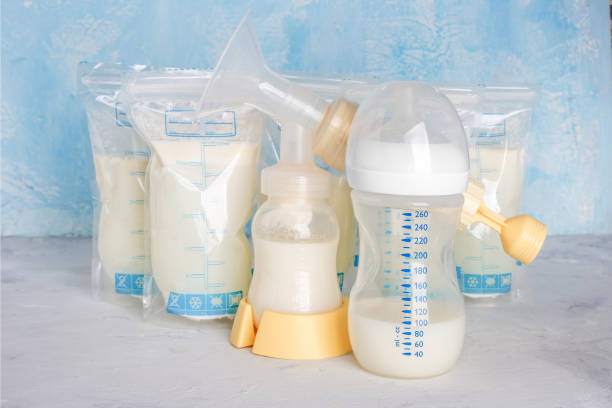
When it comes to storing breast milk, there are several techniques that can impact its smell, taste, and appearance. Proper storage is essential to maintain the quality of the milk and prevent spoilage.
One common issue that mothers may face is breast milk smelling like eggs. This can be a sign of excess lipase activity, which breaks down the formerly stored breast milk into fat and gives it a soapy or rancid smell. However, it’s important to note that breast milk that smells like eggs could also indicate bacterial contamination, which can be harmful to the baby’s health.
To prevent breast milk from smelling like eggs, it’s crucial to follow proper storage techniques. Here are some tips to keep in mind:
- Store freshly pumped milk in clean containers or bottles that have been sterilized before use.
- Label the containers with the date and time of expression to ensure that the milk is used or discarded within the recommended time frame.
- Store breast milk in the refrigerator at a temperature of 32-39°F (0-4°C) for up to four days. Avoid storing milk in the fridge door, as the temperature may fluctuate.
- If you plan to store breast milk for longer periods, freeze it immediately after expression. Breast milk can be stored in the freezer for up to six months.
- Thaw frozen breast milk in the refrigerator or under running water. Avoid using a microwave, as it can destroy the nutrients and create hot spots that can burn the baby’s mouth.
- If you notice that your breast milk smells like eggs after storage, try scalding it before freezing. This can help to deactivate the excess lipase and prevent the milk from developing an off smell.
By following these storage techniques, you can ensure that your breast milk remains fresh and safe for your baby to consume. If you continue to experience issues with breast milk smell or taste, consult a lactation consultant or healthcare provider for further guidance.
Lipase and Its Effect on Breast Milk

Lipase is an enzyme that is naturally present in breast milk and plays only a small number crucial role in breaking down fats. The enzyme helps the baby to digest fats from the freshly expressed breast milk and absorb important fat-soluble nutrients such as vitamins A, D, E, and K.
However, in some cases, the level of lipase in breast milk can be high – bile salt dependent lipase, which can cause the milk to develop a soapy or metallic smell, similar to that of rotten eggs pumped milk. This can happen when the lipase in the milk breaks down the fats too quickly, leading to the production of free fatty acids that give the milk the unpleasant odor.
It is important to note that while high lipase levels can cause the high lipase breast milk to smell and taste different than high lipase milk, it is not harmful to the baby. Most babies with high lipase milk do not mind the change in taste, and the high lipase breast milk remains safe to consume.
If a mother notices that her expressed breast milk smells like eggs, she can try scalding the milk before storing it. Scalding expressed milk involves heating the milk to a temperature that is high enough to inactivate the lipase enzyme, but not so high that it destroys the essential nutrients in the milk. After scalding, the milk can be cooled and stored as usual.
It is also worth noting that not all mothers experience high lipase levels in their breast milk, and even those who do may not notice any changes in the smell or taste of their milk. Therefore, it is not necessary for all mothers to scald their milk before storing it.
Scalding Breast Milk to Reduce Smell
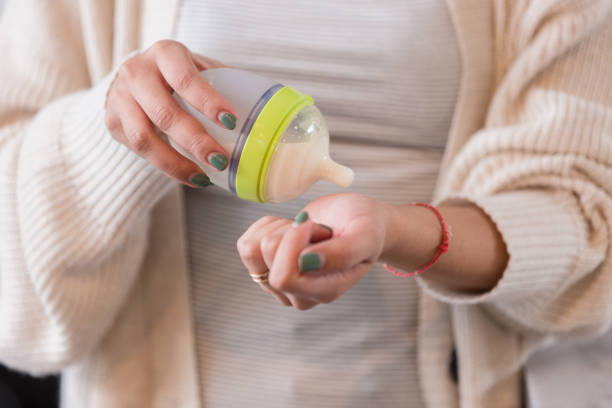
If a mother’s breast milk smells like eggs or milk issues has a sour taste, it may be due to an excess of lipase, an enzyme that breaks down fats in the milk. Scalding the mother’s milk before storing it can help the enzyme lipase and reduce the smell and taste of stored milk.
To scald breast milk, a mother can use a pan made of stainless steel, which is a good conductor of heat and does not react with the milk. First, the mother should heat the milk in a pan until it reaches a temperature of around 180°F (82°C) for 15 seconds. Then, she should immediately cool the scald milk down by placing the pan of frozen milk in a bowl of ice water.
It is important to note that scalding breast milk can cause a loss of some of the milk’s beneficial nutrients. Therefore, mothers should only scald breast milk if necessary and not as a routine practice.
Mothers can also check if their breast milk is rancid fats has an excess of lipase by pumping the milk out and storing it in a bottle in the fridge. The following day, they can smell the fresh pumped milk once again. If it smells sour or tastes rancid, it may be due to an excess of lipase.
In addition to scalding breast milk, mothers can also try using appropriate heat milk storage containers to prevent the frozen milk itself from absorbing odors from other foods in the fridge or freezer. Glass, polypropylene food grade, and polybutylene plastic are some of the best containers for storing breast milk in refrigerator or freezer.
Overall, scalding breast milk can be an effective way to reduce the smell and taste of breast milk that has an excess of lipase. However, mothers should only scald breast milk if necessary and not as a routine practice to avoid a loss of beneficial nutrients.
Breast Milk, Medication and Smell

Breast milk is the primary source of nutrition for infants and is essential for their growth and development. However, some mothers may notice that their breast milk has an unusual smell, such as a rotten egg-like odor. This can be concerning, but it is usually harmless and can be resolved with a few simple steps.
One of the common causes of breast milk smelling like eggs is high levels of lipase. Lipase is an enzyme that breaks down fats in breast milk, and when it is present in high levels, it can cause the milk to have a soapy or rancid smell. This is not harmful to the baby, but they may not like the taste of the milk.
Another reason why breast milk may smell like eggs is due to certain medications that the mother may be taking. Some medications can alter the taste and smell of breast milk, and this can be passed on to the baby. For example, antibiotics, antidepressants, and antipsychotic medications can all affect the smell of breast milk.
It is important for mothers to talk to their healthcare provider before taking any medication while breastfeeding. They can help determine if the medication is safe to take while breastfeeding and if any precautions need to be taken.
In some cases, mothers may need to pump and discard their breast milk for a short period while taking medication to avoid exposing their baby to any potential risks. They can also try to time their medication doses so that they are not breastfeeding immediately after taking the medication.
In conclusion, breast milk that smells like eggs is usually harmless and can be resolved with some simple steps. Mothers should talk to their healthcare provider if they are concerned about the smell of their breast milk, especially if they are taking any medication.
Issues Related to Breast Milk Smell
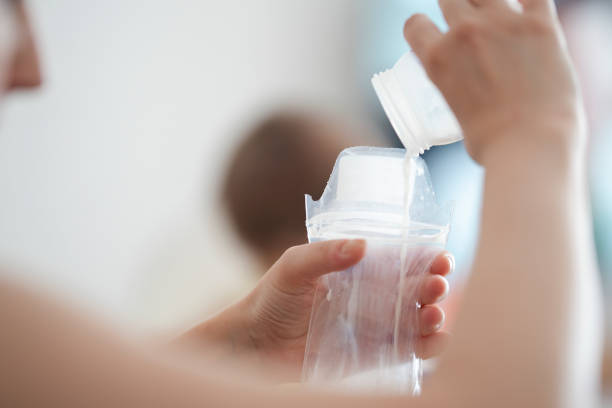
Breast milk is essential for a baby’s healthy growth and development, but sometimes, it can have an unpleasant smell. A common concern among breastfeeding mothers is when their breast milk smells like eggs or rotten eggs. This can be a cause of worry, but there are several reasons why this happens, and most of them are not alarming.
High Lipase Activity
One of the most common reasons for breast milk smelling like eggs is high lipase activity. Lipase is an enzyme that aids in digestion and helps the baby absorb all the great nutrients in breast milk. However, some mothers have higher levels of lipase in their milk, which can cause the milk to develop a soapy smell and even taste soapy. This is not harmful to the baby, but if the baby starts rejecting the breast milk smells soapy and tastes soapy, there is a way to prevent and fix it. Scalding the milk before storing it can help inactivating the enzyme and prevent the smell.
Milk Storage
Another reason why breast milk sometimes smells sour like eggs is due to improper storage. If breast milk is not stored properly, it can start to spoil and develop a sour or rancid smell. This can happen if the milk is stored at room temperature for too long or if it is not refrigerated or frozen immediately after pumping. It is essential to follow proper storage guidelines to prevent the milk from spoiling and developing a bad odor.
Infection or Mastitis
In some cases, a foul smell in breast milk can be a sign of infection or mastitis. Mastitis, also is a painful ailment brought on by inflamed and infected breast tissue. Along with other symptoms like discomfort, redness, and swelling, it can also cause the smell of rancidity or sourness to develop in breast milk. A woman must seek medical help right away if she feels these symptoms.
Other Issues
There are other issues that can cause breast milk to have an unpleasant smell, such as a change in the mother’s diet or certain medications. If the smell persists, it is essential to consult a healthcare provider to rule out any underlying health conditions.
In summary, breast milk smelling like eggs is a common concern among breastfeeding mothers. While it can be alarming, most of the reasons are not harmful to the baby. Proper storage, scalding, and seeking medical attention for any symptoms can help prevent or fix the issue.
Breast Milk Smell and Baby’s Acceptance
Breast milk has a unique smell and taste that varies from woman to woman. While some women may notice a sweet, creamy, or nutty scent, others may detect a slightly sour or metallic odor. However, if your breast milk smells like eggs or rotten eggs, it can be a cause for concern.
When breast milk smells like eggs, it may indicate that the milk has high levels of lipase, an enzyme that breaks down the fats in milk. While lipase is essential for the digestion of milk, too much of it can cause the milk to smell and taste off. Additionally, if breast milk is not stored properly, it can develop a rancid or sour smell that resembles rotten eggs.
If your baby is rejecting breast milk that smells like eggs, it’s important to understand that this is not uncommon. Babies have a highly developed sense of smell and taste, and they may refuse to consume breast milk that smells or tastes different than usual. Some babies may even vomit or experience digestive issues if they consume milk that has a strong odor or taste.
To prevent your breast milk from smelling like eggs, it’s essential to store it properly. You can freeze the milk immediately after expressing it to prevent the growth of bacteria that can cause it to spoil. You can also scald the milk before storing it to inactivate the lipase enzyme. Scalding milk involves heating the milk to a temperature just below boiling (around 180°F) and then cooling it down quickly.
If you notice that your breast milk smells like eggs, you can try scalding it before feeding it to your baby. However, if the smell persists, it’s best to consult a lactation consultant or your healthcare provider to rule out any underlying health issues.
Conclusion
In conclusion, breast milk smelling like eggs is a common occurrence that can be attributed to several factors. One of the main reasons for this smell is the presence of excess lipase in the milk. Lipase is an enzyme that helps break down the fats in the milk, but when present in excess, it can cause the milk to have an off-odor, usually like cheese, vomit, metallic, or eggs.
Another reason for breast milk smelling like eggs is bacterial contamination. If breast milk is not stored properly, bacteria can grow in it, leading to an unpleasant smell. It is essential to follow proper storage guidelines to prevent bacterial growth in breast when storing human milk well.
It is important to note that breast milk smelling like eggs does not necessarily mean that it is unsafe for the baby to consume. High lipase levels in breast milk do not affect the nutritional content of the milk, and it is safe for the baby to consume. However, if the smell is due to bacterial contamination, it is best to discard the milk to avoid any potential harm to the baby.
In summary, breast milk smelling like eggs is a common occurrence that can be attributed to excess lipase or bacterial contamination. It is important to follow proper storage guidelines to prevent bacterial growth and discard any milk that may be contaminated.



